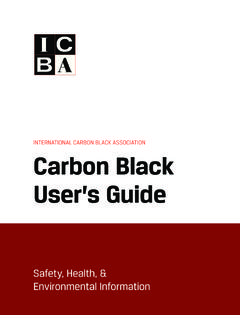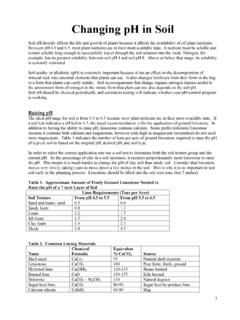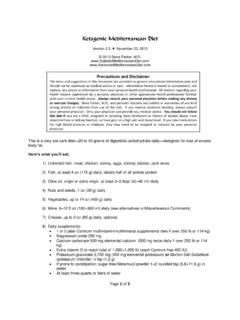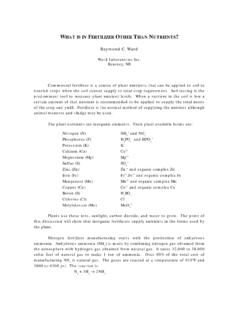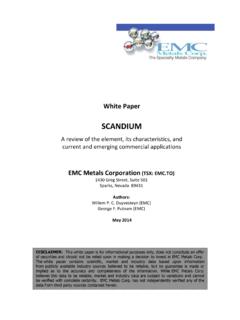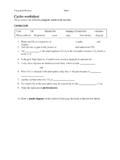Transcription of SULPHUR FIRES INFORMATION PACKAGE - Sultran
1 Rail Car SULPHUR FIRES 1 Issued June 2017 LTD. SULPHUR FIRES - INFORMATION PACKAGE - FOR FIREFIGHTERS & EMERGENCY FIRST RESPONDERS Issued June 2017 Rail Car SULPHUR FIRES 2 Issued June 2017 of Contents Safety and fire Fighting Tips / 3 Introrduction .. 4 SULPHUR - An Overview .. 5 Product Identification and TDG Regulations .. 6 Physical State .. 7 Appearance, Odor and Hazardous Ingredients .. 8 Buring Properties of SULPHUR - Summary and Review .. 9 Key Temperatures, Weights and Measurements .. 11 After the fact evidence of SULPHUR railcar fire .. 14 Photos of an actual SULPHUR railcar fire .. 17 Figthing SULPHUR FIRES .. 19 Human Impact, First Aid and Protective Clothing .. 20 1. Sensitization / Desentization .. 21 2. Irritancy .. 22 Exposure Limits .. 23 Route of 24 First Aid Procedures .. 25 1.
2 Solid elemental SULPHUR .. 25 2. Liquid elemental SULPHUR .. 26 Personal Protective Equipment .. 28 1, Gloves .. 28 2. Clothiing .. 28 3. Footwear .. 29 4. Eyes .. 29 5. Respiratory Protective Equipment .. 30 6. Ingestion .. 30 BURNING SULPHUR - KEY POINTS .. 31 MATERIAL SAFETY DATA SHEET .. Appendix 1 Rail Car SULPHUR FIRES 3 Issued June 2017 AND fire FIGHTING TIPS Always use Self Contained Breathing Apparatus (SCBA). SULPHUR FIRES produce hazardous SULPHUR dioxide gas. SULPHUR dioxide gas is heavier than air and will accumulate in the vapour spaces of the rail car. Small SULPHUR FIRES are easily extinguished by adding more SULPHUR on top of the burning SULPHUR . This depletes the oxygen and smothers the fire . For larger SULPHUR FIRES use a light water fog or CO2 to extinguish.
3 Do not use heavy water streams as this may create SULPHUR dust which could potentially explode. Heavy applications of high pressure water may create environmental ground contamination as the high water pressure may drive the SULPHUR out of the rail car and on to the ground. DISCLAIMER The INFORMATION provided in this document is for guidance only. It is based on what is believed to be sound data, experienced advice and best practice. The authors accept no responsibility or liability for its use by others in any circumstances The flame propagation test demonstrated in the presentation utilizes Prill product. All other types of commercially formed SULPHUR , such as Rotoform, Slates, Pellets or Granules would produce the exact same results. That is, none of these forms of elemental SULPHUR are classified as a flammable solid.
4 Rail Car SULPHUR FIRES 4 Issued June 2017 This INFORMATION PACKAGE has been prepared for the guidance of those who must respond to the challenge of fighting FIRES involving elemental SULPHUR . More particularly the specific applications cited focus on FIRES in commercially formed solid elemental SULPHUR being transported in open rotary dump gondola rail cars. The PACKAGE consists of this document and an accompanying video illustrating various aspects of the ignition, combustion and extinguishing of SULPHUR FIRES . While this document makes reference to much of the material covered in the video, it also contains additional material that is not included. This additional material provides extended coverage of topics commonly found in Material Safety Data Sheets and may be useful in training courses on the subject of SULPHUR and its burning characteristics and hazards.
5 Rail Car SULPHUR FIRES 5 Issued June 2017 An Overview elemental SULPHUR comes from two main sources. It is mined from deposits of the element in the earth, recovered from SULPHUR containing gases, such as hydrogen sulphide that are produced from natural deposits (usually in conjunction with gas or oil) or from industrial processes. The SULPHUR is first produced in liquid form and it is either stored, handled and transported in that form or it is commercially formed into pastilles, pellets, granules, slates or other shapes by cooling and solidifying the liquid. The ease with which SULPHUR can be melted and resolidified is an important factor in understanding how it burns. It is the handling of FIRES in these solid commercial forms of elemental SULPHUR that is the main focus of this document. The worldwide annual tonnage of elemental SULPHUR used is one of the highest of all chemical raw materials.
6 Tens of millions of tonnes find their way into a wide variety of products namely fertilizers, chemicals and various acid industries. Typically it is first converted into sulphuric acid which is one of the key process chemicals in industry. The first step in this process, is the burning of SULPHUR to form SULPHUR dioxide, exactly what happens in a burning SULPHUR rail car. The predominant use of SULPHUR in the fertilizer industry is through the manufacture of sulphuric acid which is then used to extract the phosphorous (P) for fertilizer from ore rocks. Transporting elemental SULPHUR for acid and phosphate fertilizer manufacture is a key component to feeding the world s growing population and it is much safer to transport compared to the acid it is used to produce.
7 Canadian recovered SULPHUR is typically shipped at greater than purity. It is this exceptional purity which gives Canadian producers a significant advantage in selling their product to end users all over the world for multiple applications. Rail Car SULPHUR FIRES 6 Issued June 2017 IDENTIFICATION AND TDG REGULATIONS COMMERCIALLY FORMED elemental SULPHUR UN (United Nations) PIN 1350 SULFUR; or SULPHUR CAS# (American Chemical Society/Abstracts) 7704-34-9 (all elemental SULPHUR ) IMSBC (International Maritime Solid Bulk Cargoes Code- adopted in 2008) SULPHUR (formed, solid) Group C (Non-hazardous cargo) Solid elemental SULPHUR is listed in Transport of Dangerous Goods regulations as a Class Flammable Solid, Category with special provision 33 which EXEMPTS commercially formed SULPHUR from classification under Transport of Dangerous Goods Regulations as a Class flammable solid.
8 This exemption resulted from the test data submitted to the regulatory authorities on the rate of flame propagation in standard tests of the various types of commercially formed solid elemental SULPHUR that are commonly used in rail shipment of the product. The details of the tests are presented in the video part of this PACKAGE and the results were accepted by the UN sub- committee on Transportation of Dangerous Goods leading to the exemption ruling. As result the Schedule 2 special provision 33(b) was applied to UN1350 SULPHUR which states these regulations do not apply to these dangerous goods if the dangerous goods have been formed to a specific shape such as prills, granules, pellets, pastilles or flakes . Notwithstanding the exemption, it is common to find the UN 1350 signage on rail cars dedicated to the haulage of solid elemental SULPHUR .
9 Rail Car SULPHUR FIRES 7 Issued June 2017 STATE SOLID: Commercially Formed into Granules, Pellets, Prills or Pastilles of generally spherical or hemispherical type; or into more two dimensional Flake or Slate types. The physical state description above applies to Canadian Bright Yellow elemental SULPHUR , in bulk, as shipped by rail to West Coast Terminals for export to overseas customers. It is important to recognize this particular physical state in connection with product classification under transport, storage and handling regulations. The combustion propagation characteristics of these forms may be considerably different from other physical forms of SULPHUR having the same chemical purity. Other forms are described as being in the following physical states - Lump, Crushed Bulk, Flowers of SULPHUR , SULPHUR Flour Micronized SULPHUR , Stick, Powder, Crude, Screened Crude SULPHUR among others.
10 Rail Car SULPHUR FIRES 8 Issued June 2017 , ODOUR AND HAZARDOUS INGREDIENTS Commercially formed solid elemental SULPHUR is generally bright yellow in colour. If the solid SULPHUR is off-yellow it is usually due to impurities. This should not be confused, however, with the colour of liquid SULPHUR which is formed when the solid melts as it does from heat of combustion. The colour of liquid SULPHUR is the best indicator that the SULPHUR is very likely burning. Yellow SULPHUR first melts to a golden coloured free-flowing liquid. As its temperature rises, the colour turns to orange, then dark red and finally black. All of these colours may be seen in a pool of burning liquid SULPHUR as is clearly seen in several of the shots in the video presentation. Pure elemental SULPHUR is essentially odourless and is considered to have a very low toxicity towards humans.
